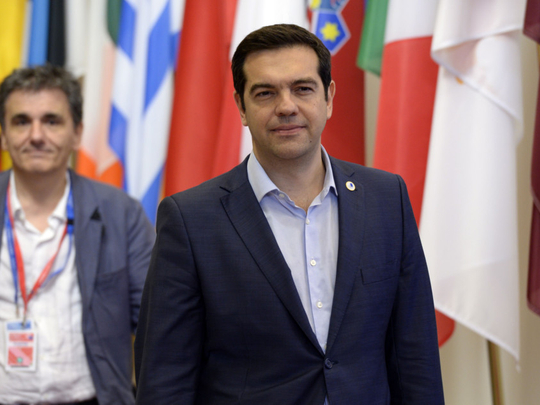
When European leaders emerged from more than 16 hours of talks to announce a deal that would keep Greece in the Eurozone, three elements stood out. The first was the bleary-eyed appearance of almost everyone who took the platform; which was understandable, as talks expected to last a few hours had gone on right through the night.
The second was the absence from the formal press conferences of the man who was arguably the author of all the trouble, the Greek Prime Minister Alexis Tsipras. He spoke to journalists more informally, a little later. But by then it was clear that the symbolism had not lied. Although couched in fairly careful language, subject to votes in the Greek parliament and with the proposed privatisation fund to be based in the country rather than — as originally suggested — abroad, the agreement reached deprives Greece of an enormous amount of its sovereignty. It may stop short of the “coup” mentioned at times overnight, but Greece is no longer master of its own destiny.
And the third striking element was the recurrent use by European Union (EU) leaders of the words “trust” and — still more indicatively — “unanimity”. The need for trust was easily explained: Germany, in particular, but not exclusively, has felt repeatedly let down by Greece and its failure to deliver on firm undertakings in the past. German Chancellor Angela Merkel was determined that this should not happen again and was under pressure from both public opinion and her own MPs to return with cast-iron guarantees.
The emphasis on unanimity — by the President of the European Union (EU) council Donald Tusk and the President of the European Commission (EC) Jean-Claude Juncker, among others, was more telling. On and off the record statements before and during the overnight talks betrayed differences of opinion that went far beyond the long-standing duel between Berlin and Athens. Finland — which generally prefers a softly-softly approach to EU diplomacy — aligned itself publicly with Germany’s tough approach, as did Slovakia, another usually quiet Eurozone state. The EU countries are suddenly looking outward in many different and divisive ways
Dangers in a rift
Far more significant however were differences that opened up between Germany and France. Until Sunday night, Merkel and French President Francois Hollande had striven almost heroically to present a united front, visiting each other’s capitals for preparatory talks before almost every potentially contentious EU discussion on Greece. With Merkel rooted in the centre right, and a staunch advocate of sound money, and Hollande in many ways an old-fashioned French socialist, less sympathetic to “austerity”, there was always room for differences in emphasis, but the two leaders appreciated the dangers in a rift at the heart of the Eurozone and had been careful not to let them show.
With the “unanimous” agreement this morning, it would appear that the danger of an open split at Europe’s core has been averted, along with the risk of Grexit. But the tensions will remain, not only because philosophical instincts in northern and southern Europe on such matters as debt are so different, but because old-fashioned geopolitics is reasserting itself across the region, pulling even longstanding EU members in opposite directions. The southern countries face the refugee crisis from across the Mediterranean; France has made a partial return to Africa, as a byproduct of the chaos in Libya. The countries to the north, and especially the east, are newly apprehensive about Russia, following events in Ukraine, but their fears are not entirely shared by the “new” Europeans further south, who are more concerned about their economic losses from anti-Russian sanctions.
The EU countries are suddenly looking outward in many different and divisive ways. Until now, though, the Franco-German alliance has remained constant, and the union, including the common currency, remains intact. On Sunday night, it was possible, if only fleetingly, to sense the perils that await if centre cannot hold.
— Guardian News & Media Ltd
Mary Dejevsky is a writer and broadcaster. She is a former foreign correspondent in Moscow, Paris and Washington, and a special correspondent in China.









